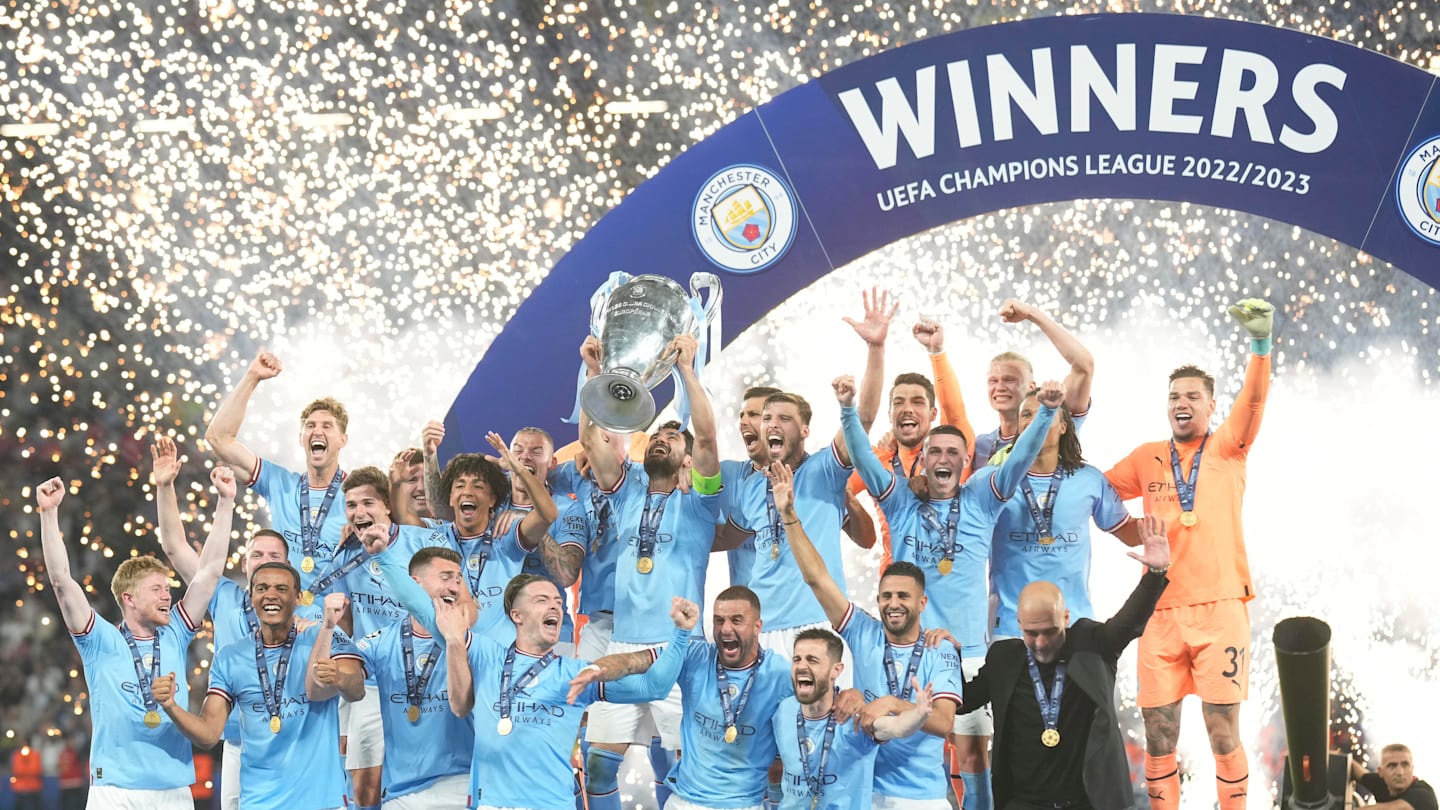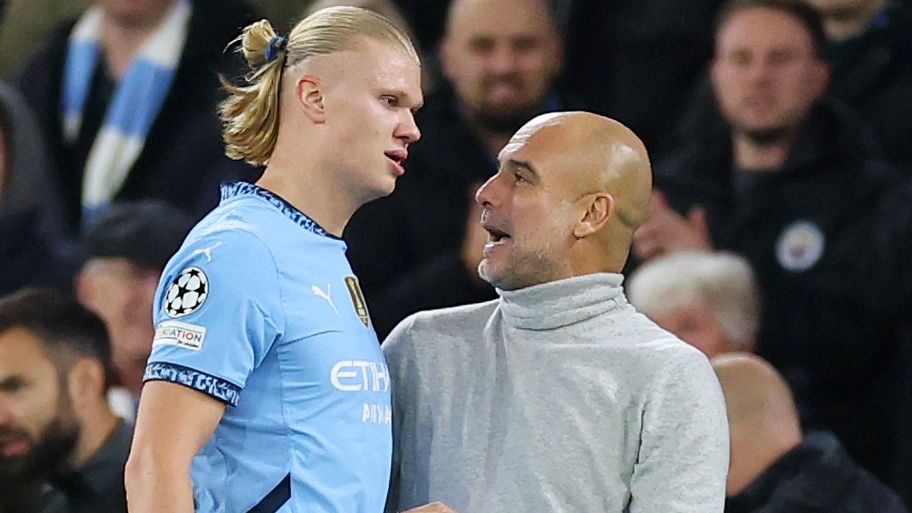They can't have all thoseSports illustrated has us top

Longest Unbeaten Streaks in Champions League History
The biggest and best clubs in Europe have all enjoyed lengthy unbeaten runs in the Champions League.www.si.com
Goal.com have us top

Man City eclipse rivals Man Utd as they make Champions League history with incredible unbeaten record | Goal.com UK
Manchester City made Champions League history by beating Sparta Prague as they eclipsed rivals Manchester United with an incredible unbeaten record.www.goal.com
Hell even the Sun has us top.

Man City break Man Utd's impressive CL record thanks to Uefa loophole
MANCHESTER CITY have set a new record for the longest Champions League unbeaten streak… despite going out of the competition to Real Madrid last season. Pep Guardiola’s side sealed the …www.thesun.co.uk
The athletic rag can fuck off :)
You are using an out of date browser. It may not display this or other websites correctly.
You should upgrade or use an alternative browser.
You should upgrade or use an alternative browser.
Media discussion - 2024/25
- Thread starter Ric
- Start date
- Status
- Not open for further replies.
thismeansfour
Well-Known Member
- Joined
- 20 May 2024
- Messages
- 525
- Team supported
- City
I agree with the winning run narrative. We lost a tie last April. If you get knocked out of a competition there is a winner and a loser. I get the not being beaten over 90 minutes argument which is an achievement in itself. Isn't anything to get wound up by, every other fan thinks the same to be fair, isn't an anti city thing.
I called him ragiowski on the Muen..said he was a rag and shouldn't be allowed to report on City..but surprisingly the MUen took down the comments..he's a fucking bigmouthed rag **** that shouldn't be allowed anywhere near our club
Many people will moan about their job and some will hate it with every fibre. Imagine then anyone on here having to write about United on a daily basis. Having to go the Stinking Swamp and talk to their players. I can’t think of a worse job.
Jesus Christ, he mustn’t have any soul.
The perfect fumble
Well-Known Member
- Joined
- 3 Jun 2012
- Messages
- 26,021
But it only becomes a thing when it's City.I agree with the winning run narrative. We lost a tie last April. If you get knocked out of a competition there is a winner and a loser. I get the not being beaten over 90 minutes argument which is an achievement in itself. Isn't anything to get wound up by, every other fan thinks the same to be fair, isn't an anti city thing.
and isn't he a WBA fan?Just switched 5live on. Adrian Chiles is still debating the city winner at Wolves. ‘Surely Bernardo was interfering with play as he was stood next to the keeper’ unbelievable
gray740
Well-Known Member
I caught that as well .still bleating about it the fucktard ! Is he not a baggies fan ? Think he would be happy that the goal stood if so the Wolves fan or ex player he was interviewing ( I turned it off before I could confirm it ) was totally for the goal ironically !Just switched 5live on. Adrian Chiles is still debating the city winner at Wolves. ‘Surely Bernardo was interfering with play as he was stood next to the keeper’ unbelievable
Adrian Chiles and loyalty. They don't go hand-in-hand.and isn't he a WBA fan?
TinFoilHat
Well-Known Member
- Joined
- 26 Jan 2023
- Messages
- 38,537
- Team supported
- Manchester City
Chiles is a Baggie he won't have enjoyed saying that.Just switched 5live on. Adrian Chiles is still debating the city winner at Wolves. ‘Surely Bernardo was interfering with play as he was stood next to the keeper’ unbelievable
:D
TinFoilHat
Well-Known Member
- Joined
- 26 Jan 2023
- Messages
- 38,537
- Team supported
- Manchester City
Just ask his ex wife Jane Garvey...Adrian Chiles and loyalty. They don't go hand-in-hand.
cityontheup
Well-Known Member
- Joined
- 9 Oct 2008
- Messages
- 1,380
BBC twats highlights real madrids unbeaten run though
urban genie
Well-Known Member
- Joined
- 11 May 2008
- Messages
- 35,043
it has alway been a weird one bit whem liverpool won 2 cups after drawing games in 90 mins it was flipped for them as a positive, now it is beimg flipped to demean us.I agree with the winning run narrative. We lost a tie last April. If you get knocked out of a competition there is a winner and a loser. I get the not being beaten over 90 minutes argument which is an achievement in itself. Isn't anything to get wound up by, every other fan thinks the same to be fair, isn't an anti city thing.
the game is 90 mins, if a draw the extra time or pens decide the status of those competimg(go through or go out) , but not the result of the game, until they change that officially all these journalist are doing is being spoilt cunts having a strop
It should be enough to fool him :)I can pass on yer regards if that helps. Call you AlfBlue so he doesn't guess.
TinFoilHat
Well-Known Member
- Joined
- 26 Jan 2023
- Messages
- 38,537
- Team supported
- Manchester City
Prick Parry going to be on Prime time Sky News later to slag is off...
I mean 'discuss the football regulation bill'.
I mean 'discuss the football regulation bill'.
kippaxwarrior
Well-Known Member
- Joined
- 3 Jun 2009
- Messages
- 23,432
- Location
- Jupiter Mining Corporation Red Dwarf
- Team supported
- City of course!!
But under the rules from Uefa, FIFA and IFAB state we didn't lose that tie as it was Draw after 210 mins. The penalty shootout was to determine who progresses to the next round and doesn't effect the result at fill time.I agree with the winning run narrative. We lost a tie last April. If you get knocked out of a competition there is a winner and a loser. I get the not being beaten over 90 minutes argument which is an achievement in itself. Isn't anything to get wound up by, every other fan thinks the same to be fair, isn't an anti city thing.
The record books show we drew that quarter final tie
eyalluvitt
Well-Known Member
We are the pantomime villain, it generates massive interest from the enormous seethe. All the whilst claiming we are irrelevant because we don’t have a nationwide fan base.Just switched 5live on. Adrian Chiles is still debating the city winner at Wolves. ‘Surely Bernardo was interfering with play as he was stood next to the keeper’ unbelievable
In good company then
bakerdave76
Well-Known Member
- Joined
- 12 Feb 2009
- Messages
- 5,148
horlock_was_super
Well-Known Member
- Joined
- 8 Jul 2009
- Messages
- 4,183
- Location
- In complete despair at 93:19
- Team supported
- Manchester City F.C.
So does Donna SummerHenry Winter likes this post
horlock_was_super
Well-Known Member
- Joined
- 8 Jul 2009
- Messages
- 4,183
- Location
- In complete despair at 93:19
- Team supported
- Manchester City F.C.
A squashy faced Baggie questioning a goal against Wolves - good grief.Just switched 5live on. Adrian Chiles is still debating the city winner at Wolves. ‘Surely Bernardo was interfering with play as he was stood next to the keeper’ unbelievable
Anyone would think the BBC encouraged a narrative against some teams…….
Stiff Little Wingers
Well-Known Member
- Joined
- 25 Aug 2010
- Messages
- 2,992
Prouder than punch for my team to have created such an historic record.it has alway been a weird one bit whem liverpool won 2 cups after drawing games in 90 mins it was flipped for them as a positive, now it is beimg flipped to demean us.
the game is 90 mins, if a draw the extra time or pens decide the status of those competimg(go through or go out) , but not the result of the game, until they change that officially all these journalist are doing is being spoilt cunts having a strop
But whenever the Madrid game is talked about by me or with me it is always sling the lines of “we got beat on pens……what the fuck was Bernardo doing?”
The point being no one says we drew but lost on pens given the fact that going to pens is an indication the game was a draw.
I remember YaYa sticking the last spot kick in v the dippers at Wembley. That was to win us the League Cup.
- Status
- Not open for further replies.



